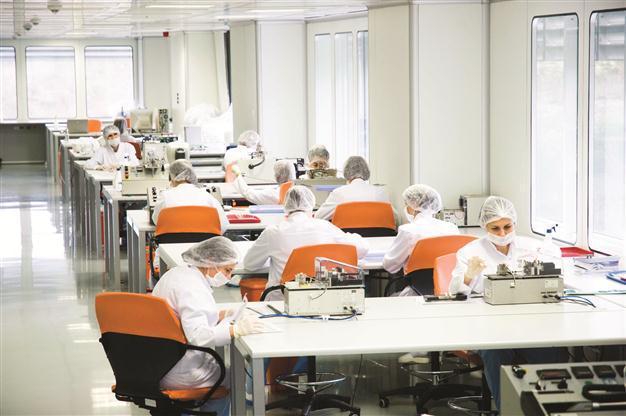Firm to send stents to the heart of Asian giant
ISTANBUL - Hürriyet Daily News

Chinese stent market promises a potential volume of $370 million, says Bozkurt. DHA photo
Alvimedica, a local coronary artery stents manufacturer, and Altıparmak, a honey producer, have become the latest Turkish businesses to take steps into the giant Chinese market.China, where there are 30 million cardiac patients, is a lucrative market for the stents business, according to Alvimedica, which entered the Asian county officially with a launch meeting in Beijing Jan. 11.
“We are sure that we, Alvimedica, will become an important and strong choice in the Chinese stent market, which promises a potential volume of $370 million annually,” said Cem Bozkurt, the chief executive, in a press release yesterday.
Stent is an artificial tube commonly used in coronary arteries to prevent localized flow constriction.
Altıparmak, meanwhile, said 2012 will be a year to become acquainted with the Chinese market, which is the world’s biggest honey exporter with an annual volume of 100,000 tons.
Altıparmak is the local market leader with a 57 percent share in 2011, plans to push into the Chinese market in the coming years with an aggressive sales strategy, the honey producer said in a statement Jan. 17. The firm is also this month launching a 30 million Turkish Liras investment in storage, analysis and packaging in Istanbul.
“It is more attractive for Turkish firms to sell goods to the Chinese market then making direct investment there, and recently they are focusing on this,” said Gökşin Duman, the Asia-Pacific Region Coordinator at Foreign Economic Relations Board (DEİK) during a phone interview yesterday.
Not for direct investors
Local firms are in search of alternative export markets as Europe, Turkey’s largest export market, faces sluggish to zero growth at present. China is increasingly becoming a center of attraction for Turkish firms.
“Generally speaking, marble and chemical industries promotion groups, initiated by leather and hazelnut sectors, have taken China in their sights. They are conducting market search strategies,” said Duman. “Apart from that, from winemakers to the traditional Turkish export goods – such as dry food – producers are working to enter Chinese market.”
China was responsible for the 18.1 percent of foreign trade balance deficit of $97.7 billion in the first 11 months of 2011, according to Turkish Statistical Institute (TÜİK). Turkey’s imports reached about $20 billion, while exports were at a mere $2.2 billion in the same period.
Turkish firms have been shy so far in direct investment to the second largest economy of the world. The total Turkish direct investment to China is about $150 million, according to DEİK’s latest data, its June 2011 report on China. This is a fraction of the foreign direct investment in China, which rose 9.7 percent to $116 billion last year, Chinese government statistics show.
“We have entered a course of time that one must be cautious [in terms of direct investment], according to us,” said Duman, adding that the average minimum wage in China has risen to more than $260 dollars, which was about $80 three or four years ago.
Servet Yeşilyurt from Istanbul contributed to this report.
















